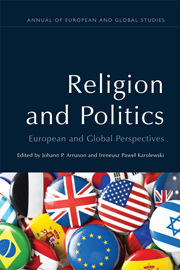Book contents
- Frontmatter
- Contents
- 1 Introduction
- 2 The Religio-political Nexus: Historical and Comparative Reflections
- 3 Politics and Religion in a Global Age
- 4 Comparative Secularisms and the Politics of Modernity
- 5 Europe in the Global Rise of Religious Nationalism
- 6 The European Union's Civil Religion in the Making?
- 7 Democracy, Secularism and Islam in Turkey
- 8 Orthodox Religion and Politics in Post-Soviet Russia
- 9 Religion and Politics, Church and State in Chinese History
- 10 Religion and the State in Contemporary Japan
- 11 Arab Revolutions and Political Islam: A Structural Approach
- 12 Beyond Post-secularism: Religion in Political Analysis (Review Article)
- Notes on the Contributors
- Index
7 - Democracy, Secularism and Islam in Turkey
Published online by Cambridge University Press: 05 September 2014
- Frontmatter
- Contents
- 1 Introduction
- 2 The Religio-political Nexus: Historical and Comparative Reflections
- 3 Politics and Religion in a Global Age
- 4 Comparative Secularisms and the Politics of Modernity
- 5 Europe in the Global Rise of Religious Nationalism
- 6 The European Union's Civil Religion in the Making?
- 7 Democracy, Secularism and Islam in Turkey
- 8 Orthodox Religion and Politics in Post-Soviet Russia
- 9 Religion and Politics, Church and State in Chinese History
- 10 Religion and the State in Contemporary Japan
- 11 Arab Revolutions and Political Islam: A Structural Approach
- 12 Beyond Post-secularism: Religion in Political Analysis (Review Article)
- Notes on the Contributors
- Index
Summary
This chapter aims at revealing the tension between democracy, secularism and Islam in contemporary Turkey by focusing on the Islamist, Kurdish and Alevi claims vis-a-vis the monolithical state regime, which has so far denied the ethno-cultural and religious plurality of the society. The main premise of this article is that the social and political transformation of contemporary Turkey under the reign of the Justice and Development Party (AKP, Adalet ve Kalk?nma Partisi) does not re constitute a democratic form of governance as the AKP has also proved to be bearing the authoritarian and repressive legacy of the Kemalist state tradition despite the fact that it receives its legitimation from the fight it has been performing against the Kemalist rhetoric. This chapter will claim that Turkish democracy is yet far from consolidation as the divide between laicism and Islam has so far been ideologically fabricated and exploited by both the so-called laicist and Islamist groups. Hence it will be argued that the democratic consolidation in Turkey is subject to the easing of this tension between the advocates of laicism and Islamism.
This chapter substantially profited from the findings of two separate FP7 (Framework Programme 7) projects, in which I was involved between 2009 and 2012. The first research, entitled Identities and Modernities in Europe (IME), mainly dealt with the ways in which European identities and modernities were constructed in different countries. The second research, entitled Tolerance, Pluralism and Social Cohesion: Responding to the Challenges of the 21st Century in Europe (Accept Pluralism) looked into the efficiency of the regime of tolerance in resolving the tensions resulting from ethno-cultural and religious diversity in various European countries.
- Type
- Chapter
- Information
- Religion and PoliticsEuropean and Global Perspectives, pp. 115 - 139Publisher: Edinburgh University PressPrint publication year: 2014



